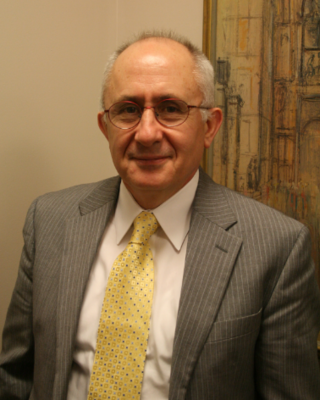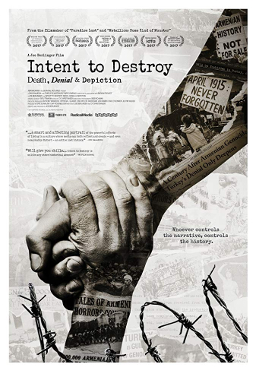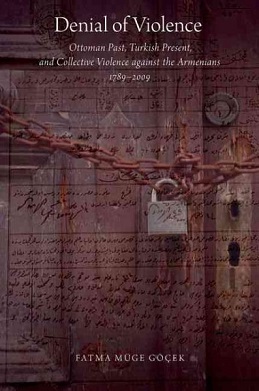
The Armenian genocide was the systematic destruction of the Armenian people and identity in the Ottoman Empire during World War I. Spearheaded by the ruling Committee of Union and Progress (CUP), it was implemented primarily through the mass murder of around one million Armenians during death marches to the Syrian Desert and the forced Islamization of others, primarily women and children.

Nutuk was a speech delivered by Ghazi Mustafa Kemal from 15 to 20 October 1927, at the second congress of Republican People's Party. The speech covered the events between the start of the Turkish War of Independence on 19 May 1919, and the foundation of the Republic of Turkey, in 1923. It took thirty-six hours to be read by Atatürk, and became a foundation of Kemalist historiography. Nutuk marked a turning point of Turkish nationalism by introducing a series of new myths and concepts into the vernacular of public discourse, such as republic, democracy, sovereignty of the nation, and secularism. Atatürk designated these concepts as the 'most precious treasures' of Turkish people, the 'foundations' of their new state, and the preconditions of their future 'existence' in his speech.

Armenian genocide denial is the negationist claim that the Ottoman Empire and its ruling party, the Committee of Union and Progress (CUP), did not commit genocide against its Armenian citizens during World War I—a crime documented in a large body of evidence and affirmed by the vast majority of scholars. The perpetrators denied the genocide as they carried it out, claiming that Armenians in the Ottoman Empire were resettled for military reasons, not exterminated. In its aftermath, incriminating documents were systematically destroyed. Denial has been the policy of every government of the Ottoman Empire's successor state, the Republic of Turkey, as of 2024.

In the psychology of human behavior, denialism is a person's choice to deny reality as a way to avoid believing in a psychologically uncomfortable truth. Denialism is an essentially irrational action that withholds the validation of a historical experience or event when a person refuses to accept an empirically verifiable reality.
The Assembly of Turkish American Associations (ATAA), created in 1979, is the umbrella organization whose stated purpose is to promote cooperation between the social and cultural Turkish American organizations around the United States. ATAA informs the Turkish American community on how to foster Turkish-American relations and promotes a positive view of Turkey. The organization is also known for its unsuccessful lawsuits arguing for the inclusion of Armenian genocide denial as a legitimate alternate view in the US educational curriculum.
The Battle of Dilman took place during World War I fought at Dilman between the Russian Empire and the Ottoman Empire.

Altuğ Taner Akçam is a Turkish-German historian and sociologist. During the 1990s, he was the first Turkish scholar to acknowledge the Armenian genocide, and has written several books on the genocide, such as A Shameful Act (1999), From Empire to Republic: Turkish Nationalism and the Armenian Genocide (2004), The Young Turks' Crime Against Humanity (2012), and Killing Orders (2018). He is recognized as a "leading international authority" on the subject. Akçam's frequent participation in public debates on the legacy of the genocide have been compared to Theodor Adorno's role in postwar Germany.

Ra's al-'Ayn camps were desert death camps near the city of Ras al-Ayn, where many Armenians were deported and slaughtered during the Armenian genocide. The site became "synonymous with Armenian suffering".
The Sèvres syndrome refers to a popular belief in Turkey that dangerous internal and external enemies, especially the West, are "conspiring to weaken and carve up the Turkish Republic". The term originates from the Treaty of Sèvres of the 1920s, which partitioned the Ottoman Empire among Armenia, Greece, Britain, France, and Italy, leaving a small unaffected area around Ankara under Turkish rule; however, it was never implemented since it was left unratified by the Ottoman Parliament and due to Turkish victory on all fronts during the subsequent Turkish War of Independence. Turkish historian Taner Akçam describes this attitude as an ongoing perception that "there are forces which continually seek to disperse and destroy us, and it is necessary to defend the state against this danger".

Intent to Destroy: Death, Denial, & Depiction is a 2017 documentary film directed by Joe Berlinger about the Armenian genocide.
Turkish textbooks have faced criticism for their negative depiction of Greeks and Armenians, lack of depiction or explicit denial of Ottoman-era massacres and genocides, denial of the existence of the Kurdish people, as well as understating and condoning Ottoman-era slavery. According to a study by Abdulkerim Şen, human rights education in Turkey subscribes to the 'escapist model'; Şen explains that Turkish textbooks either deliberately avoid human rights issues, struggles, campaigns, and activists altogether, or window-dress human rights issues by presenting de-contextualised narratives. Şen further states that the curriculum fails in respect of critically examining on discrepancies about claims made in Turkish textbooks vis-à-vis realities of human rights; and has scope to improve the curriculum encouraging learners to explore transformative powers of Human Rights Education.
Bibliography of the Armenian genocide is a list of books about the Armenian genocide:
The terminology of the Armenian genocide is different in English, Turkish, and Armenian languages and has led to political controversies around the issue of Armenian genocide denial and Armenian genocide recognition. Although the majority of historians writing in English use the word "genocide", other terms exist.
Fatma Müge Göçek is a Turkish sociologist and professor at the University of Michigan. She wrote the book Denial of Violence in 2015 concerning the prosectution of Armenians in the Ottoman Empire and Turkey, for which she received the Mary Douglas award for best book from the American Sociological Association. In 2017, she won a Distinguished Faculty Achievement Award from the university.

Denial of Violence: Ottoman Past, Turkish Present and Collective Violence Against the Armenians, 1789–2009 is a 2015 book by Turkish sociologist Fatma Müge Göçek which deals with the denial, justification, and rationalization of state-sponsored violence against Armenians in the Ottoman Empire and Turkey from the eighteenth to the twenty-first century, focusing especially on the Armenian genocide and its persistent denial in Turkey. Among the arguments made in the book is that the Armenian genocide was an act of foundational violence that enabled the creation of the Republic of Turkey and its continuing denial is an ideological foundation of the Turkish nation-state. The book was praised by reviewers for its extensive research and methodological innovation, although some noted that it was dense and not easy to read for those not familiar with the topic.
Vicken Cheterian is a Lebanese-born journalist and author, who teaches international relations at Webster University Geneva. He has also lectured at University of Geneva and SOAS University of London (2012-14). Cheterian is also a columnist for the Istanbul-based weekly Agos. He holds a PhD from Graduate Institute of International and Development Studies (IUHEI).
The Workshop for Armenian/Turkish Scholarship (WATS) is a group of scholars which is dedicated to transcending the nationalist historiography on the Armenian genocide and answering related questions. It first met in 2000. The workshop and the book it published were widely praised as first-class scholarship that significantly advanced the field. According to the workshop organizers, Turkish participants have faced state harassment for their participation.
Ahmet Esat Uras (1882–1957) was a perpetrator of the Armenian genocide who later wrote The Armenians in History and the Armenian Question (1950), an apologist work which has been described as "the ur-text of Turkish denialist 'scholarship'".
Ottoman Armenians During the Decline of the Empire: Issues of Scientific Responsibility and Democracy was a conference on the Armenian genocide held from 24–25 September 2005 at Bilgi University in Istanbul, jointly organized by Bilgi, Boğaziçi University, and Sabancı University. The first conference to challenge Armenian genocide denial in Turkey, it was initially scheduled to be held in May 2005 at Boğaziçi, but was postponed due to a judicial ban on the conference.
National economy is the economic plan, essentially kleptocratic, envisioned by Ziya Gökalp and carried out by successive Ottoman and Turkish governments, which involved the systematic dispossession of native Christian upper-classes and their replacement by Muslim Turks, in addition to large-scale confiscation and redistribution of Christian-owned property. Türk Yurdu announced 1915 as the starting year of the national economy. To Emil Ludwig, Talaat Pasha mentioned that the loss of the Armenian workforce would damage the economy for a short while, but that Turks would step in their positions and replace the Armenians soon.








